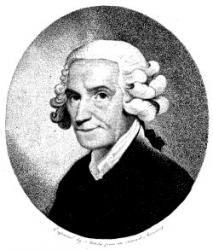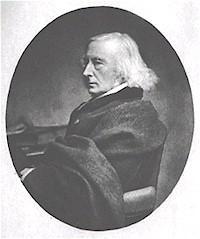Planning worship?
Check out our sister site, ZeteoSearch.org,
for 20+ additional resources related to your search.
- |
User Links
Person Results
‹ Return to hymnal



Export as CSV
S. W. Wilkinson
Hymnal Number: 99 Composer of "[O, what a world this might be]" in A Book of Song and Service
S. W. Wilkinson
James Nares

1715 - 1783 Hymnal Number: 97 Composer of "AMSTERDAM" in A Book of Song and Service Born: April 19, 1715, Stanwell, Middlesex, England.
Died: February 10, 1783.
Buried: St. Margaret’s, Westminster, England.
After his family moved to Oxford, Nares became a chorister in the Chapel Royal. He later became deputy organist at St. George’s Chapel, Windsor; organist in York Cathedral (1734); and organist in the Royal Chapel and composer to the king (1756). He received a doctorate of music degree from Cambridge University in 1756. In 1770, the Catch Club awarded him a prize for his glee To All Lovers of Harmony.
Sources:
Frost, p. 683
Nutter, p. 462
http://www.hymntime.com/tch/bio/n/a/r/nares_j.htm
====================
http://en.wikipedia.org/wiki/James_Nares
James Nares
John Stuart Blackie

1809 - 1895 Person Name: J. S. Blackie Hymnal Number: 48 Author of "Angels Holy" in A Book of Song and Service Blackie, John Stuart, LL.D., born at Glasgow, July, 1809, and educated at Marischal College, Aberdeen, and at the University of Edinburgh. After a residence on the Continent for educational purposes, he was called to the Bar in 1834. In 1841, he was appointed Professor of Latin in Marischal College, Aberdeen, and in 1850 Professor of Greek in the University of Edinburgh. On the death of Dr. Guthrie he was for some time the Editor of the Sunday Magazine. His published works include:— A Metrical Translation of AEschylus, 1850; Pronunciation of Greek, 1852; Lyrical Poems, 1860; Homer and the Iliad, 4 vols., 1869, &c.; Lays and Legends of Ancient Greece, &c, 1857; and Songs of Religion and Life, 1876. To the hymnological student he is known by his rendering of a portion of the Benedicite (q.v.), "Angels, holy, high and lowly," which is found in several hymnals.
-- John Julian, Dictionary of Hymnology (1907)
=======================
Blackie, J. S. , p. 144, i. Dr. Guthrie was succeeded as editor of the Sunday Magazine by Dr. W. G. Blaikie, and not by Dr. J. S. Blackie. The latter resigned his professorship in 1882, and died March 2, 1895.
--John Julian, Dictionary of Hymnology, New Supplement (1907)
John Stuart Blackie
F. W. Turner
Hymnal Number: 2 Adapter of "[Father, we love to meet]" in A Book of Song and Service
F. W. Turner
William Channing Gannett

1840 - 1923 Person Name: W. C. Gannett Hymnal Number: 134 Author of "He Hides Within the Lily" in A Book of Song and Service Gannett, William Channing, M.A., s. of Dr. Ezra Stiles Gannett, was b. at Boston, March 13, 1840, and educated at Harvard College, 1860, and the Divinity School, Cambridge. Entered the Unitarian Ministry in 1868, and after filling several pastorates he became Pastor of the Unitarian Church at Rochester, N.Y., 1889. Mr. Gannett's hymns, mainly written for special occasions, were included in great part in The Thought of God in Hymns and Poems, Boston, 1st Series 1885,2nd Series 1894,
the combined production of F. L. Hosmer (q.v.) and himself. Of Mr. Gannett's hymns the following are in common use:—
1. Bring, 0 morn, thy music [God Everlasting.] Written in 1893, and printed in A Chorus of Faith, being an account and resume of the Parliament of Religions, held in Chicago, 1893. Included in The Thought of God, 2nd Series, 1894, and again in several hymnals.
2. Clear in memory's silent reaches. [Memory.] Written in 1877 for a Free Religious Assoc. Festival, and published in The Thought of God, 1st Series, 1885.
3. Prom heart to heart, from creed to creed. [Faith.] Written in 1875 for the 150th anniversary of the First Religious Society in Newburyport, and given in The Thought of God, 1ist Series, 1885. Usually st. ii. is omitted.
4. He hides within the lily. [Divine Providence.] "Consider the lilies, how they grow." Written in 1873, and printed for use at the Free Religious Assoc. Festival, May 30th, 1873. Published in The Thought of God, &c, 1st Series, 1885, in 4 stanzas of 8 lines. The most widely used of the author's hymns.
5. I hear it often in the dark. [The Voice of God.] Written at Milwaukee, in 1870, and published in The Thought of God, &c, 1st Series, 1885. Sometimes it begins with st. iii., "0 God within, so close to me," as in Hymns for Church and Home, Boston, 1895.
6. Praise to God and thanksgiving. [ Harvest.] Written in 1872 for a Harvest Festival at St. Paul's, Minn., of which he was then Pastor, and included in The Thought of God &c, 1st Series, 1885. in the Boston Pilgrim Hymnal, 1904, it begins "Praise to God, and thanks we bring."
7. Sleep, my little Jesus. [ Christmas Carol.] Written for the Sunday School, St. Paul's, Minn., in 1882, and given in The Thought of God, 2nd Series, 1894, as "Mary's Manger Song."
8. The Lord is in His holy place. [Dedication of a Place of Worship.] Written for the Dedication of the Rev. C. W. Wendte's Church, Chicago, April 24, 1873, and pub. in The Thought of God, &c, 1st Series, 1885. It is one of the most popular and widely used of the author's hymns.
9. The morning hangs its signal. [Morning.] This is dated by the author "Chicago, July 30, 1886," and printed in Love to God and Love to Man, being No. 28 ot the Chicago "Unity Mission" series of hymns (N.D.). Also included in The Thought of God, &c, 2nd Series, 1894. Although in some sense a Morning hymn, it is adapted for use in Advent. It is usually known as “The Crowning Day."
10. The Truth is the Voice of God. In the "Unity Mission" Series, No. 28 (see above), this is given as No. 33, with the title "Truth and Righteousness and Love," in 4 stanzas of 4 lines and a refrain of 4 lines.
These annotations are based upon manuscript notes kindly supplied by the author. The use made of Mr. Gannett's hymns shows that their poetic beauty and loving sympathy with all things beautiful and pure, are widely appreciated in America and to a limited extent in Great Britain also.
--John Julian, Dictionary of Hymnology, New Supplement (1907)
William Channing Gannett
Maria S. Ragland
Hymnal Number: 62 Composer of "[I hear a sweet voice ringing clear]" in A Book of Song and Service
Maria S. Ragland
Leon Herbert
Hymnal Number: 85 Author of "Little by Little" in A Book of Song and Service
Leon Herbert
Hermann Kotzschmar
1829 - 1908 Person Name: H. Kotzschmar Hymnal Number: 193 Composer of "[Come forth, and bring your garlands!]" in A Book of Song and Service
Hermann Kotzschmar


 My Starred Hymns
My Starred Hymns


